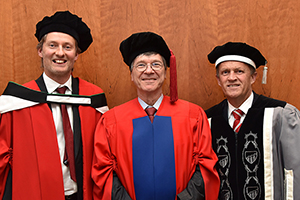Latest News Archive
Please select Category, Year, and then Month to display items
03 January 2020
|
Story Xolisa Mnukwa
|
Photo Supplied
 The UFS Bloemfontein Campus, South Campus, and Qwaqwa Campus choirs are student-centred choirs functioning under the Student Affairs’ Arts, Culture and Dialogue office.
The UFS Bloemfontein Campus, South Campus, and Qwaqwa Campus choirs are student-centred choirs functioning under the Student Affairs’ Arts, Culture and Dialogue office.
It has been a noteworthy year for the University of the Free State (UFS) Choir, establishing itself on the student/university choir scene. The choir, based on the Bloemfontein Campus, represented the UFS at the bi-annual KUESTA choir festival earlier this year, showcasing its musical talent. The choir shared a stage with other university choirs from around the country.
The UFS (Bloemfontein Campus) Choir is a 42-member ensemble of students; the other two choirs, based on the South and Qwaqwa campuses, consist of 40 and 62 members respectively. The choirs are administered and managed by the Division of Student Affairs’ Arts, Culture and Dialogue Office. In addition to Kovsie culture, the choirs strive to have a varied repertoire of inclusive music, with the UFS BFN Campus choir performing a diversity of songs in English, Afrikaans, isiXhosa, and Sesotho.
The new South Campus choir was established in 2018 and is led by choir director, Bonisile Gcisa, who specialises in choral music. This leg of the choir will therefore perform many of his works, but will also include some of the Bloemfontein choir’s set lists, since most of the choir members will be auditioning in 2021 for the Bfn choir when they change campuses.
The Qwaqwa Campus choir will lean more towards a choral genre under the direction of Sipho Khumalo.
The UFS Bloemfontein Campus choir was officially re-established under the leadership of choir conductor Leona Geldenhuys in March 2018, and has performed at several events, including the Rector’s Concert, the annual KUESTA choir convention, and the Bloemfontein Choir invitational. The group has also held a number of public performances on the Thakaneng Bridge at the UFS Bloemfontein Campus.
“Part of the UFS Student Affairs’ objective is to create an inclusive and a socially just student lived experience, and that is the mandate the choirs will also adopt. We hope to create an experience that not only enhances our students’ singing abilities, but also contribute to a more inclusive university experience.” – Angelo Mockie – Director: UFS Student Affairs Arts, Culture and Dialogue office.
“Rest well, be safe, and return rejuvenated,” were his parting words to students for the festive season.
Prof Jeffrey Sachs presented with honorary doctorate at Spring Graduation Ceremony
2015-10-01

Prof Jeffrey Sachs (centre) with Prof Philippe Burger,
Head of Department: Economics (left), and
Prof HJ Kroukamp, Dean of the Faculty of Economic and
Management Sciences (right).
Photo: Charl Devenish |
“Quality education is the best accelerator for sustainable growth. Universities have a unique role to play in this regard,” Prof Jeffrey Sachs said during a lecture he presented at the University of the Free State (UFS) Faculty of Economic and Management Sciences. He gave an insightful overview of the new Sustainable Development Goals (SDGs) of the United Nations. The 17 SDGs replace the Millennium Development goals of the past 15 years. In a major achievement, 193 countries will sign the goals at the United Nations (UN) in New York on 25 September 2015.
Prof Sachs is the director of The Earth Institute, Quetelet professor of Sustainable Development, and professor of Health Policy and Management at Columbia University. He is also a special advisor to the UN Secretary-General Ban Ki-moon on the Millennium Development Goals, and director of the UN Sustainable Development Solutions Network. Another accolade now added to his résumé is an honorary doctorate in Economics conferred on him by the UFS at the Spring Graduation Ceremony on 17 September 2015 for outstanding achievements and contribution to academia.
“South Africa is not achieving sustainable development. It has the highest inequality in the world with high unemployment among the youth. Quality education is the best accelerator for growth,” Prof Sachs said. He used the high education investment in Korea as an example of that country’s growth. Prof Sachs added that the government cannot achieve the SDGs on its own. “It is important for the country and universities to take on the goals. Universities can apply pressure, influence and provide solutions.”